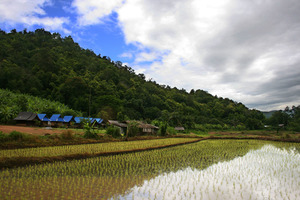In 2015, at a time when Thailand’s latest dictatorship was limiting the rights and freedoms of people to assemble and mobilise, a group of corporations led by Monsanto saw this as an opportunity to start growing GMOs in open field trials and even to begin intensive commercial trials once more. It lobbied hard for the Biosafety Bill, a draft piece of legislation that we might as well call a “GMO Liberalisation Bill”.
Click here to read this full issue of Supermarketwatch Asia
Crucially the draft bill contains a schedule of authorised environmental contaminants. Accordingly, if genetically modified life forms are listed as authorized for release into the environment in the schedule, then even if these cause damage, no-one is required to take responsibility. The draft bill requires responsibility only in the case of damages which arise from contaminants which are not listed in the schedule.
Furthermore, when considering safety or danger arising from genetically modified life forms, only clear scientific information and evidence will be taken into account, and only in the case where danger or damages have already been caused. The scope of the law is much too narrow. The draft doesn’t follow the international Biosafety Protocol which allows room for appropriate interpretation even where scientific evidence is not available. The protocol also allows consideration of socio-economic considerations (Biosafety Protocol Art,11.8, 26).
The first attempt to push for this draft arose when it was put forward for consideration by the National Reform Council in July 2015. However a case was made opposing the draft from the members of the Council who were former NGOs. At this point the draft was withdrawn. However, the issue did not end there. The cabinet still submitted the draft bill to relevant government agencies for study and consultation. The draft was then resubmitted to the cabinet for approval, and it could be seen that eventually the cabinet would send the draft to the legislative drafting committee so that it could become law.
After evaluating that there was a strong possibility of the law passing swiftly under the absolute power of the military junta, opposition to the bill stepped up a pace around the beginning of May. Biothai Foundation, a Thai organisation that is actively working on this topic, produced additional articles and infographics about the issues and the terms of the draft Bill. These were shared on social media, reaching at the peak of the campaign 800,000 people. People were encouraged to share and devise their own words and actions to express their perspectives on the potential imminent opening of Thailand to GMOs.
Various people’s networks decided to set up a D-Day for simultaneous mobilisations all over the country. They invited networks and the general public to join in and express their power to oppose the GMOs bill in front of the provincial governors officers in every province on 9 Dec 2015 at 10 am.
What happened can be considered a historic mobilisation. On that day, different networks and ordinary citizens went to the central government complexes of 46 out of 76 provinces around the country, and to protest in front of Government House in Bangkok. Networks of small-scale farmers, consumers and many agricultural traders associations who would be impacted by the bill, such as Sweetcorn Traders, Cassava Traders and the Thai Organic Farmers Association, etc. expressed their opposition to the rapid process of the bill without any participation of the people. Overall, the protest involved a total of 122 organisations, who each presented letters to the relevant officials at 10am. There was no overall coordination or leaders in charge of mobilization. Information played an important role in generating interest and awareness of the issues, but all those who took part went independently and the spontaneous nature of the protest allowed for many expressions of individual creativity. News of the protest appeared in the media for several days after the D-Day.
In the end, on 15 Dec 2015, the military government, represented by the Prime Minister, made a public announcement that the consideration of the GMO bill had been suspended.
Contact:
Kingkorn Narintarakul, BioThai
[email protected]
This article is from Supermarketwatch Asia, a quarterly email bulletin for social movements about developments in food retail and distribution in Asia produced by GRAIN (Issue No. 1, January 2016) Click here to subscribe.
